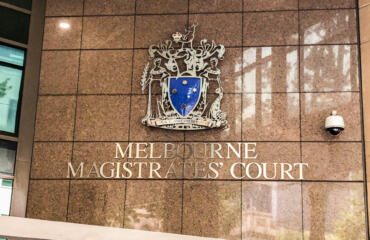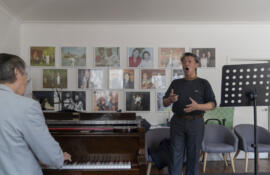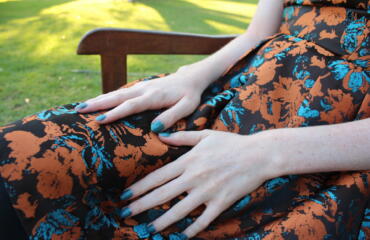‘I lived with a Jewish woman named Liz while I studied. She died of lymphoma on the same day that my supervisors told me that I could submit my thesis.
We had gradually become close friends. She made me feel at home and I will always see Melbourne through Liz’s eyes. She taught me how to enjoy life and we looked after each other.
Liz was really looking forward to the moment I finished my PhD. Unfortunately, she never got to witness that moment.

In February 2011, a year after I first came to Melbourne, I went back to Yemen for a holiday.
Protests demanding democratic reform had already started. It was obvious that something significant was happening. I decided I didn’t want to miss the chance to write about the uprising.
When I returned to Melbourne, I decided on my topic. I wanted to look at how Yemen was perceived and how that compared to the reality. The two didn’t add up and it didn’t feel right to me.
My research focussed on the one-year period of ongoing protests that began in mid-February, 2011. The media depicted the uprising in terms of religion and secularity, which generated a sense of anxiety and apprehension. They relied on the assumption that secularity is inherently democratic and religion is violent.
My thesis challenges that assumption. You cannot draw a line between the secular and religious. I am a teacher, a daughter and many other things. I hold both religious and secular values. The protesters on the ground in Yemen were the same. Their call for democracy stemmed from secular and religious factors.
To understand the ongoing political culture of apprehension that re-emerged, I had to look at the whole history of the Yemeni state and its portrayal as a threat to the regional allies of the United States, especially Saudi Arabia. Yemen was divided into North Yemen and South Yemen until 1990. It is the only republic in the Arabian Peninsula. The rest are monarchies.
You cannot draw a line between the secular and religious. I am a teacher, a daughter and many other things. I hold both religious and secular values. The protesters on the ground in Yemen were the same.
In the 1960s, Yemen became the site of a proxy war between Saudi Arabia, an ally of the United States, and Egypt, an ally of the Soviet Union. This conflict was also portrayed through a divide between the religious and the secular.
Rather than supporting the uprising in 2011, Yemeni and Western elites again polarised it along religious and secular lines. This ultimately led to the dismantling of the democratic movement and the continued domination of Yemen by regional and international powers.
They were able to dismantle the democratic movement most effectively after Islamist group Islah became involved in the uprising. Islah has been an important voice for democratic reform for many years but the Yemeni state depicted the group as an enemy which could not be trusted with the future of the country’s democracy.
A campaign of disinformation by local elites, international elites and the media forced protesters to question whether their acts of protest were worthwhile. The State also withdrew from the public domain by stopping the supply of water, electricity and fuel. This allowed groups such as al-Qa’ida to operate freely, which only added to the already apprehensive political culture.

To conclude my thesis, I looked at Saudi Arabia’s war on Yemen, which began in 2015, and the Shi’a-Sunni divide. I argue that this so-called sectarian divide is also crafted and overplayed for political reasons. Many Sunnis in Yemen go to Shi’a mosques and vice versa. Zaydi Shi’a are prominent in Yemen and they are theologically very close to Sunnis.
My family is still in Yemen. After the democratic uprising was dismantled and sectarian conflict began, it was quite a challenge to cope with the devastation in Yemen and write my thesis. It took me six years to complete.
My life revolved around my thesis for so long but in the end the fruit was sweet. My examiners, who are internationally recognised experts, praised my thesis. They recommended it for publication. I am working on developing the prospectus now. I’m also teaching undergraduates here at my alma mater. I’m entering a new and exciting phase in my career and I’m really enjoying the challenge.”
► Kamilia Al-Eriani completed her PhD last year. Her thesis is titled:‘The Apprehensive Republic: De-democratising the 2011 Yemeni Uprising.’
* My PhD is an irregular series in which The Citizen speaks with recent Melbourne University PhD graduates.



